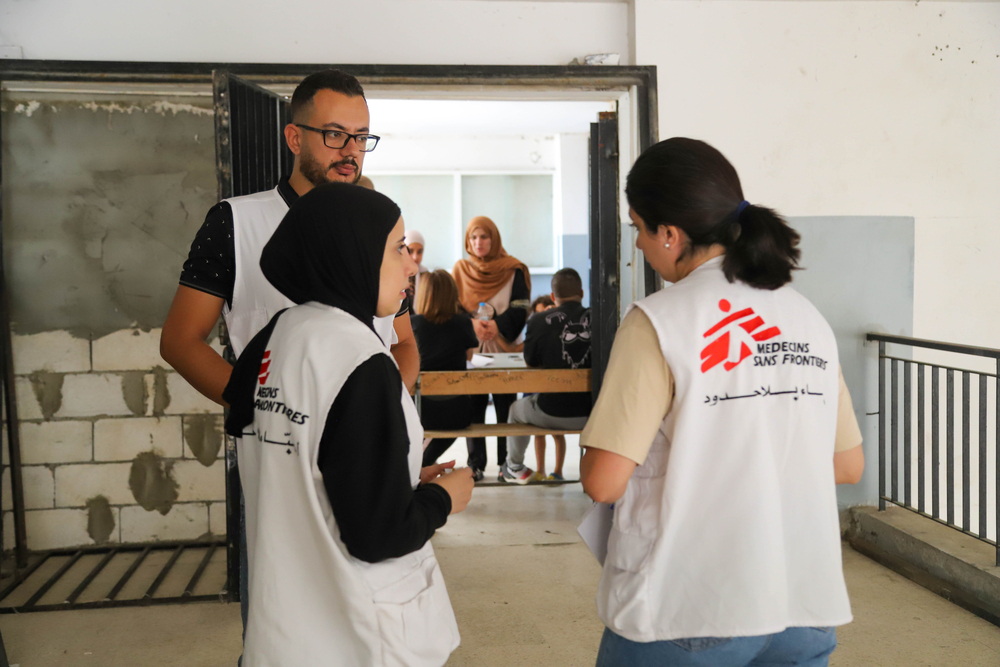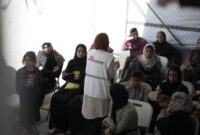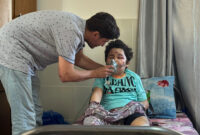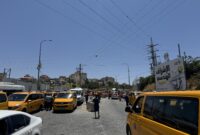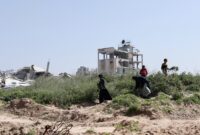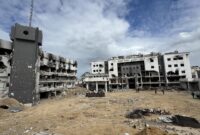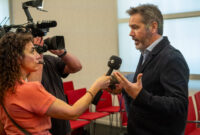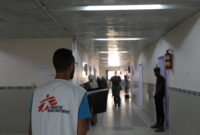Stories of displaced: Hundreds of thousands of people in Lebanon in search of a safe place after large-scale Israeli bombardments
Stories of people displaced in Lebanon
Following the large-scale Israeli bombardment in Lebanon over the past week, hundreds of thousands of Lebanese families including MSF staff, have been forced out of their houses and pushed on the roads, in a desperate search of a safe place.
MSF is providing support to displaced people in shelters, like schools, in the south of the country as well as in and around Beirut. Our teams are doing water trucking, providing psychological first aid and medical consultations, and donating essential items such as mattresses, blankets, drinking water and hygiene kits.
Alia: “I hope we can return to our houses; if there are houses to go back to”
Testimony collected on 25 September in a school in Barja, Mount Lebanon.
Alia* sits on the pavement of the school’s humble garden in Barja, a small town located Mount Lebanon, her face perplexed as if she doesn’t know what to do. Her mother-in-law, who has just undergone eye surgery, is trying to avoid the harsh sun rays.
The school Alia* is sheltering in is overflowing with displaced people like herself. Sounds of children playing fill the air, yet it cannot mask the blasts of airstrikes falling on the surrounding hills and shaking the building.
“We’re from the southern border town of Khiam. We were forced to leave our home around a year ago when clashes started. And now, we were forced to leave yet again from the house we were sheltering in. We had barely started adapting, registered our kids in a nearby school, and all of it went away.” says Alia*.
Before being forced out of her house in October 2023, Alia* was working as a nurse. Since then, she has not been able to work, and the family has lost their source of income.
In the last quarter of 2023, she spent two months trying to find a safe home for herself, her husband, and her two boys. They would move almost every ten days from one town to another, desperately trying to find a more permanent place to stay. Finally, a former colleague found her a house in the southern town of Kfartebnit, 20 kilometres away from her hometown.
On Monday 23 September 2024, a large-scale Israeli bombardment of south Lebanon started, soon spanning beyond to different densely populated areas of the country. Alia* had only the time to pack up a few things and the family went on the move.
“We left the house at 1:30 am under heavy bombing from all around us. The traffic in the south was insane. We went to two towns first, but their schools were full to the brim. We ended up sleeping that night in our car. The next morning, we came to this school and thankfully we found a classroom to house us. But we have nothing to sleep on. Fortunately, I managed to bring two blankets with me.”
The scale of displacement in Lebanon is unprecedented, which surpasses the country’s capacity to house the displaced. Main pressing needs people express are mattresses, pillows, blankets, and hygiene products, on top of medical care.
“This displacement is by far tougher than the first one. My children tell me they would rather die under bombing than to live like this. The school was shaking all night. We consider ourselves safe here for now, but what if Israel decides to target schools?”
When Alia* last visited her house in Khiam three months ago, it was heavily damaged, with all the windows shattered but at least it was still standing. She is afraid that with the latest waves of Israeli strikes, her house might have been reduced to rubbles.
“I hope one day we can return to our houses – our original houses – if there are houses to go back to.”
Hassan: “That night was like a horror movie”
Testimony collected on 30 September in Ramleh El-Bayda, Beirut.
“My name is Hassan* and I come from Nabatieh governorate, in south Lebanon. I used to live with my wife and three children in the southern suburb of Beirut.
Four days ago, we decided to leave our home with my family because we were worried about our safety. That night was like a horror movie; warplanes, airstrikes, you name it. While we were in the car, we could feel the ground shaking.
We spent the first two days in a house in another neighborhood of Beirut but then the owner asked us to vacate the apartment.
Now, we are here in Ramleh El-Bayda in Beirut. We are 20 members of my family, stranded on the beach. All shelters and schools are full. Where should we go? We have no place to go. It seems that nowhere is safe now.
The situation is far worse than anyone can imagine. We have so many needs. When we left, we only took a couple of clothes and our documentation. We couldn’t even bring a mattress or a pillow. Last night, we slept on chairs. No one is helping us. All I care about is the kids. The youngest of them is a year and a half old. How can I look out for my family?”.
Maryam: “We are in a safe place, for now”
Maryam, our field communications manager from Beirut, reported from a car as she fled, describing scenes of chaos in the southern suburbs of Beirut.
Yesterday, we heard and felt a huge series of blasts while we were in meetings at the office. We wrapped up work and got stuck in heavy traffic. I had just relocated to a safer place since the bombing around Beirut and across the country intensified on Monday. When I reached my new home around 10 p.m., my relatives had already joined us – leaving their homes, thinking it would be safer where we were.
From my balcony, I saw dozens and dozens of people walking in the streets carrying what they could, plastic bags, backpacks, or nothing. People in the southern suburbs around ours had received evacuation orders from the Israeli armed forces. We saw people fleeing on foot, some walking with sticks, young and elderly. Some people were in cars. We were not in the neighborhood that was targeted but we heard drones and planes. We felt them close by. Suddenly, there was darkness all around and bombing started everywhere. There was heavy smoke and people in the streets were coughing. I was with my mum, brother and sister, and trying to figure out what to do next. Are the roads safe? Where do we go?
I had just left my house in Dahieh—the southern suburb of Beirut—a few days ago because of the heavy bombardments and moved to this one’s. We thought we would be safer here. Now we had to leave again. I grabbed a bag of essential items I had at hand. We were told that it’s better to bring mattresses, so we stuffed two in our car and took a pack of water bottles. I didn’t know what to do. There were fires everywhere following the airstrikes, and I heard a huge blast. We heard, felt and saw the strikes. Our building was shaking. There was a huge blast in a place with no advance warning for evacuation.
Surrounded by fire and smoke, I was repeating to myself, “all we need is a plan and to take action, a plan and take action; do not wait here.” We just left the place as fast as we could. I don’t know what happened to my own house, or the new house. We kept calling around and drove for a couple of hours before we figured out where to go. Around 5 a.m, we found a place on the other side of the mountains. We were very lucky that we left when we did because the fires after the airstrikes were still raging where we had been. We just needed a place to rest a little, to see where to go next, and we still haven’t slept.
Some people are still in cars.
Now we’re watching the news and shocking footage of what is happening. I know that my colleagues, MSF teams, are in the field, supplying water by trucks to shelters and schools in Beirut and Mount Lebanon, where displaced families are staying. Some people are lying down on the sidewalks.
MSF managed to provide 86,000 liters of water in 24 hours, and is also distributing kits containing basic hygiene and relief items, as well as mattresses to the displaced people. Our mental health teams are on the streets providing psychological first aid to people who are traumatized and to people seeking refuge in schools. I am used to being a humanitarian worker, but now I am also a person displaced by air strikes in my own country. We are in a safe place, for now.
